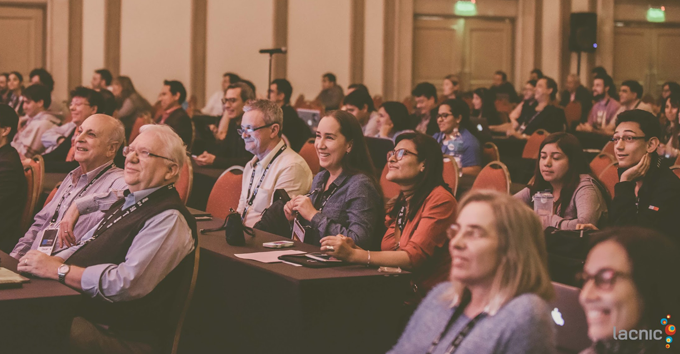The Impact of Hosting a LACNIC Event
30/01/2018

Each year, LACNIC events have a major impact on the cities where they are held. A must for the Internet community of Latin America and the Caribbean, each meeting brings together five hundred people of at least 30 different nationalities, including experts and representatives of academia, civil society, the business sector, and governments, as well as telecommunications industry professionals.
LACNIC events are among the most important Internet meetings in the region because of the level of the discussions that take place, the presentations, the speakers, and the exchange of experiences among participants.
Likewise, these events generate a cascade effect in the host countries, mobilizing local communities, promoting their participation in Internet decision-making spaces, and positioning the organizers as regional leaders (https://goo.gl/Q9KCNk).
Event sponsors and hosts have the chance to showcase their national and regional leadership on issues that are relevant for the proper development of the Internet. In addition, they promote the involvement of the national community in regional debates, their participation in the discussion of relevant Internet issues, and establishing first-hand contacts with renown regional and global experts.
Local Impact. Karen Gamboa of NIC Costa Rica, organizer of one of the 2016 LACNIC events, spoke about the challenges and benefits of the LACNIC 26 meeting for her country. “We managed to attract close to 500 network professionals and hundreds of members of the Latin American and Caribbean Internet community, who participated in talks and conferences on the current state of the Internet in the region,” said Gamboa.
According to Gamboa, the LACNIC event held in Costa Rica and other events in which the organization participated have led NIC Costa Rica to become a leader in the discussion of technology-related issues at local and international level.
Gamboa added that Costa Rica was the first country to offer sponsorships to people between 18 and 29 years of age, thus encouraging the participation of the younger generation in LACNIC events. She also noted that deploying IPv6 in the rooms where the meeting and social events took place represented a technical challenge.
The Brazilian Experience. Harmut Glaser, executive secretary of the Brazilian Internet Steering Committee, pointed out that organizing LACNIC 27 – held in 2017 in the city of Foz do Iguaçu – demanded a great deal of planning, teamwork, and negotiation with the other actors involved in the event. He noted that facilitating networking among event participants and helping them establish new contacts was very positive for NIC.br.
“Why would we encourage organizations of other countries to organize a similar event? To allow event participants learn about the infrastructure of the organizing country, and thus facilitate the exchange of information with local teams and establish new contacts,” he concluded.
More information: https://goo.gl/Q9KCNk
(Free access, no subscription required)